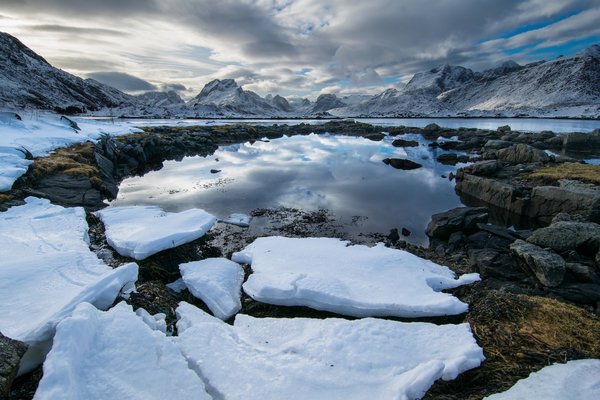Norway
The Lofoten islands
The Lofoten Islands lie north of the Polar Circle in the region of Nordland, which is topographically and biologically varied with islands with precipitous birdcliffs fringed by a narrow strandflat, sand dunes and bouldery beaches.
Geologically the area belongs to the Lofoten Eruptive Province and consists chiefly of Precambrian rocks; the rocky shores are the principal type of shore in this region. Since pre-Viking time, the Lofoten islands have been and still are the centre for the Norwegian cod fisheries. The area was settled very early and contains many unique cultural monuments.
Site Info
Official Information
- Full Name
- The Lofoten islands (ID: 1751)
- Country
- Norway
- Status
-
On tentative list 2002
Site history
History of The Lofoten islands
- 2002: Added to Tentative List
- Added to tentative list
- Type
- Mixed
- Criteria
Links
- UNESCO
- whc.unesco.org
All Links
UNESCO.org
- whc.unesco.org — whc.unesco.org
Community Information
- Community Category
- Natural landscape: Marine and Coastal
- Urban landscape: Maritime
Travel Information
Recent Connections
News
No news.
Recent Visitors
Visitors of The Lofoten islands
- Alexander Lehmann
- Ali Zingstra
- A. Mehmet Haksever
- Ammon Watkins
- Anne
- Argo
- Bram de Bruin
- Bropyk
- Christoph
- Claire Bradshaw
- Dan Pettigrew
- Ellen Nielsen
- Erik Jelinek
- Farinelli
- Federico P.
- George Gdanski
- HaraldOest
- Harry Mitsidis
- Ingrid
- Jarek Pokrzywnicki
- Jay T
- Jeffrey Chai
- Joel on the Road
- Jonas Kremer
- Kurt Lauer
- kutasp
- Luboang
- Maja
- Martina Rúčková
- MMM
- Mohboh
- MoPython
- Mstrebl1990
- nan
- Olli-Pekka Turunen
- Patrik
- Philipp Peterer
- Priyaranjan Mohapatra
- Ralf Regele
- Randi Thomsen
- Remigiusz
- RobRos
- Roman Bruehwiler
- Shandos Cleaver
- Solivagant
- Ssong.x
- stephanvermeulen
- Svein Elias
- Szabolcs Mosonyi
- Tatiana Nikulnikova
- Tom Flaten
- Truls Brekke
- Tsunami
- Walter
- Wojciech Fedoruk
- Zizmondka
Community Reviews
Show full reviews
Thanks to plentiful cod in the sea around the Lofoten, the Lofoten saw a huge influx of fishers each winter. From January to March each year is cod season and fishers would come past the polar circle for catching them. They would then be hung up to dry and sold South.
On the Lofoten, small fishing villages developed where fishers could land and sleep (rorbuer). Nowadays, you can rent their huts for staying yourself. These fishing villages are tucked against the mountains that form the backbone of the Lofoten. It's this combination of fishing villages and nature that marks the magic of the Lofoten.
OUV
The Lofoten would easily be Norway's second best WHS (after the fjords). OUV would be gorgeous nature combined with the fishing activities. The villages and huts are just iconic. And the views... I would probably rate it 4-4.5 stars. Similar sites I have seen so far would be Fjordland in New Zealand and Los Glaciares in Argentina, both of which I would rate higher. Fjordland is more unspoiled nature and covers a wider range of ecosystems. Los Glaciares has Perito Moreno, Fitz Roy, ...
When it comes to the question what precisely will be inscribed, the current nomination site doesn't hold much information. I would guess the bird areas on the outer islands, the National Park and the traditional fishing villages should be part of the core zone. With Ryten and Nusfjord I covered two of three of these.
Getting …
Keep reading 0 comments
We spent several days in Lofoten islands in summer 2016, and this was one of the highlights of our Norway trip (a country which is one of the best – if not the best – in Europe for landscapes and nature lovers). We were lucky enough to enjoy sunny weather during our stay, giving blue and turquoise color to the sea along white sandy beaches (from the pictures, this looked like tropical country, but actual air temperature never exceeded 15°C during the day!). From Unesco website, it can be understood that this TWHS is proposed as a mixed site and encompasses the south-westernmost islands of the archipelago.
We arrived by ferry from Bodo to Moskenes (it takes around 3 hours), and this was a stunning introduction to the place : sharp mountains range (some 250 km long) “grows up” over the horizon line as the ferry goes, and this combination of sea and mountain in one single landscape is one of the most beautiful in Norway. This experience was different and, in some way, complementary to our visit to the West Fjords a few days before. Lofoten islands are nothing but an old mountain range (some of its rocks are some billion years old), in the middle of the sea, eroded by successive glacial eras and resulting in cliffs, sharp peaks, bays, fjords, with few and narrow places left for human settlements. This geological process for sure would be promoted as one of the reasons for inscription. They are …
Keep reading 0 comments
